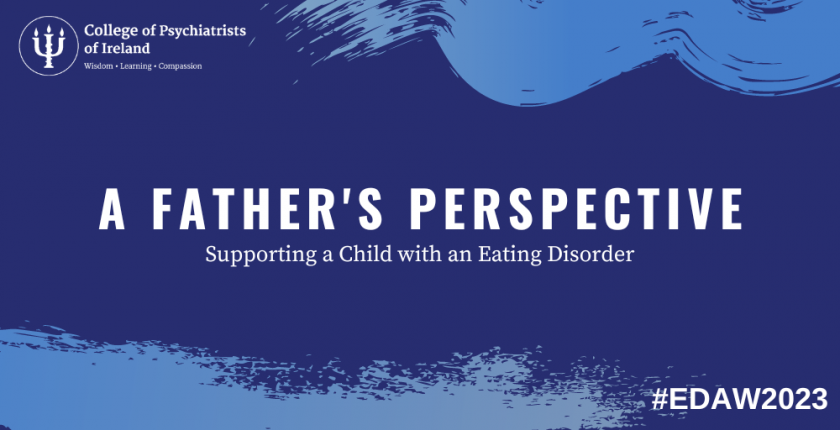Blog
A Father’s Perspective – Supporting a Child with an Eating Disorder #EDAW23
- March 2, 2023
- Posted by: ICP
- Category: Blog External Affairs & Policy Public Information Stakeholders

A father shares his personal account of the challenges encountered by the whole family in supporting and accessing care for his daughter who has anorexia.
When our teenage daughter developed anorexia and quite quickly became very unwell, one of the biggest challenges was to figure out how to access immediate and appropriate medical and psychological help to make sure that she stabilised in a safe place. Our GP was key to accessing a relatively quick assessment by CAMHS, admission to our local hospital via A&E, discharge to home and resumption of school after a few months. Initially, the main feeling was one of relief that we were able to get help in what was a very frightening and traumatic situation, for which my wife and I felt ill-equipped. The medical team in the hospital did not have eating disorder expertise available to them and CAMHS community-based psychiatrists provided limited input from their very overstretched service.
Our daughter regained and maintained a healthy weight while our family engaged with the various therapies offered by CAMHS. However, the psychological aspect of the eating disorder remained out of reach. Still, she was discharged from CAMHS when she reached 16 years old as she was maintaining a healthy weight. My wife and I felt that we were somewhat cast adrift because we could clearly see that the anorexia was still quite strong.
Relapse meant re-engaging with inpatient services. We decided to try to build a team that would focus on our daughter, support her and help her to move away from the eating disorder and toward full recovery. We felt that it was absolutely crucial to build and maintain relationships with our daughter and with her support team. Accessing specialist services was quite difficult and doesn’t seem to be based on need, as our daughter was very unwell. We saw first-hand the impact of under-resourcing and shortage of staff at every level. Our daughter received some excellent care as an inpatient and we worked really hard to be part of the team.
Communication, or the lack of it, with the treating clinicians was challenging. We sometimes felt that our input as parents was not sought or taken on board. Naturally, discharge from inpatient services was a really anxious time for our daughter, and also for us. While we did have some outpatient support from the hospital, we did not have a detailed plan. There wasn’t a handover to the outpatient support services because, as far as I can figure out, such outpatient support services don’t exist in terms of the provision of a multi-disciplinary team to support someone with a severe eating disorder. Our daughter and we, her parents, pieced together a limited community-based team of unconnected practitioners. We feel that our daughter would be better served by a fully resourced and staffed multi-disciplinary, community-based team of eating disorder specialists.
Our experience generally when engaging with eating disorder treatment services has been a positive one. W have received some wonderful support from the under-resourced and overworked clinicians that we encountered. However, it seems to us that many of these clinicians are themselves not properly supported or resourced.
I would like to mention that one of the shining lights, in the view of my wife, myself and our two daughters, has been the exceptional support that we have received from Bodywhys. I believe that we have benefited enormously from their organised group sessions, in a safe place with like-minded parents and carers. The kindness and support of other carers and sharing in their experiences continues to be hugely valuable for us.
Resources for Eating Disorder Help:
The HSE National Clinical Programme for Eating Disorders (NCP-ED) is a collaborative initiative between the HSE, the College of Psychiatrists of Ireland, and BodyWhys – the national support group for people with eating disorders.
The HSE Self-Care and information App is available to download to your mobile phone and provides accurate, up-to-date information and tips on how to stay well when managing an eating disorder
Bodywhys is the national voluntary organisation supporting people with eating disorders. Bodywhys is committed to the belief that people can and do recover from eating disorders. They strive to empower people affected by eating disorders to access information, support and treatment.
PO Box 105, Blackrock, Co.Dublin
Helpline: 01 2107906
Email: alex@bodywhys.ie
Website: www.bodywhys.ie
